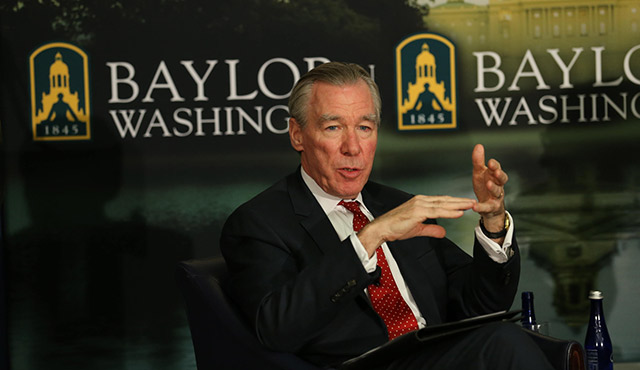For many, the image of the rich and powerful business leader brings to mind the greedy and unscrupulous Gordon Gekko of “Wall Street” fame or “Dallas” oilman J.R. Ewing. Or, in the real world, such outliers as Ponzi schemer Bernie Madoff, Kenneth Lay and Jeffrey Skilling of Enron and former Tyco CEO Dennis Kozlowski, for example.
But leaders in the Catholic community – including The Catholic University of America, the national university of the Catholic Church in the U.S. and home to 12 schools and 21 research facilities – want to change this perception. And they mean business.
Teaching “Business as a Force For Good,” the university’s School of Business and Economics is guided by Catholic principles, particularly the key tenants of Catholic social teaching: human dignity, solidarity, subsidiarity (large institutions should never interfere with the decisions of individuals and smaller organizations) and the common good.
Like other top programs, the school provides a solid education in accounting, economics, finance, international business, management and marketing. But what separates the School of Business and Economics from the rest of the pack is its strong emphasis on faith and spirituality in the business world.
“What we’re trying to do is marry Catholic social teaching with free-market enterprise,” says Tim Busch, chair of the School of Business and Economics’ advisory board.
Busch knows a thing or two about marrying the teachings of Catholicism with financial success. A practicing attorney for 35 years, he is the founder and CEO of Pacific Hospitality Group, a hotel-development and management company. Since 1990, he has been a member of Legatus, an organization composed of Catholic CEOs and their spouses. He and his wife, Steph, co-founded St. Anne School in Laguna Niguel in 1992, and JSerra Catholic High School in San Juan Capistrano in 2003. Busch has been honored with many awards for his good works.
“Anyone can get a marketing, accounting or finance degree,” he says. “When they do, will they balance their business knowledge with a strong spiritual life? That makes a big difference.”
Busch and his contemporaries stress the importance of operating from a position of holiness. “It’s essential that young people have a prayer life, and that includes prayer about business decisions,” he says. “‘God, what do you want me to do here?’ Everyone benefits.”
But why would someone who wants to help the world – an altruistic soul who might otherwise run a homeless shelter or organize food drives – go into business to make big bucks?
“The purpose of business and an economy is to make it possible for people to receive the goods and services necessary for living a decent life,” says Dr. Thomas I. White, the author of “Socrates Comes to Wall Street” and director of the Center for Ethics and Business at Loyola Marymount University. “Profit is simply the means to this end. So when business is doing its proper job, it is behaving altruistically.”
In addition, the more you earn, the more you can give. And the more you give, the more others will be empowered to do the same.
The balance of business and faith is essential, regardless of one’s chosen profession. “The business school teaches students that they have a responsibility to do more than make a profit,” Busch says. “They should balance the interests of the community with succeeding financially.”
Since its founding in 1887 by U.S. Catholic bishops, with the support of Pope Leo XIII, The Catholic University of America stresses being of service to others as an element of this balance.
“It’s important that we all give back of our time and our treasure,” Busch says. “It’s very healthy and helps to develop a spiritual person.”
This business-faith blend also applies to where a person works and what he or she does for a living.
Busch says: “Before Steve Jobs hired John Sculley, [the president of Pepsi-Cola], he said, ‘Do you want to sell sugared water for the rest of your life? Or do you want to come with me and change the world?’”
Given that The Catholic University of America was founded “to discover and impart the truth through excellence in teaching and research, all in service to the Church,” many of its business students surely want to do more than make millions – they, too, want to change the world.

